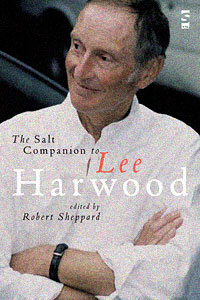
| Jacket 36 — Late 2008 | Jacket 36 Contents page | Jacket Homepage | Search Jacket |
The Internet address of this page is http://jacketmagazine.com/36/r-harwood-rb-dunagan.shtml
Lee Harwood
«The Salt Companion to Lee Harwood» edited by Robert Sheppard
reviewed by Patrick James Dunagan
Paperback, 238 pages. Salt Publishing (UK). 9781844710775
http://www.saltpublishing.com/
This review is about 3 printed pages long. It is copyright © Patrick James Dunagan and Jacket magazine 2008.See our [»»] Copyright notice.
1
Lee Harwood is no monster. He’s English! A durable sort, relaxed in his native manner. Reading his work is a distinct pleasure, however for the unacquainted the recently published Collected Poems (Shearsman, 2007) leaves one wondering here and there on this or that particular reference and The Salt Companion to Lee Harwood helps clarify and connect the dots.
2
Harwood’s poems invite the reader to enter places of deep dwelling, providing for meditative occasions which are generously extrapolated upon by the essays gathered here. The tribute of such a collection is well deserved. Harwood’s name doesn’t come up often enough in discussion of recent poetry and it’s a shame. Selections from his second collection The Man With Blue Eyes (Angel Hair, 1966) were included in The Angel Hair Anthology (Granary, 2001) and Ron Silliman, along with some others, has written on-line comments about the Collected Poems, yet prior to such attention there have been scant nods given to his work (in the U.S. at least).
paragraph 3
This is surprising, not least because Harwood’s friends or lovers (John Ashbery, Bobbie Louise Hawkins, Sandy Berrigan, etc) are a who’s who of cross connections in the last 40 years of American poetry. Harwood is no gossip, however, & does not wear his lovers as a badge. When they arise within the poetry it is to secure the interests of the poem at hand and nothing else. The Companion is an excellent tool to thus flush out further particulars of Harwood’s various interests and pursuits, mining the depths behind the well crafted poems while taking provocative delight in lyricism and fancy.

4
Few aspects of Harwood’s work do not receive coverage. An excellent balance is maintained throughout between biographical anecdote (always in relation to sorting through references within the poems) and critical exegesis of both form and idea behind the work. Much attention is paid (for good reason as the quality merits it) to the earlier work which shows an American poetic influence varying from New York School to Black Mountain, reflecting time Harwood spent living and traveling in the States and romantic relationships he developed with American poets and spouses. In addition, there are essential essays included such as William Rowe’s covering of Harwood’s translations of Tristan Tzara and Jacqueline Phillip’s discussion of the “short, short Story” with emphasis on the influence of Borges which explore deeper implications of areas somewhat at the fringe of Harwood’s work.
5
What becomes increasingly clear reading through the Companion is Harwood’s implicit desire through the years to remain simply and not so simply a writer and how this effects critical commentary, at times obfuscating exegesis. Harwood’s consummate attention to bringing life into the written language delights readers of the work but also challenges the critic. The successful attempts gathered here to further elucidate Harwood’s work make this book a valuable resource for future readers, scholars, and poets alike. A bibliography is included and the range of material astounds. That Harwood has current readers is as evident as the fact that the future holds many more.
6
Thoreau says he went to the woods to find himself. Harwood writes poems. His instincts are automatic and, after a fashion, legionnaire in humbleness — which is apparent in the included interview. The Companion serves both the poetry and the man well, but the poetry remains paramount as is his preference.
7
An ultimate gentleman, Lee Harwood writes poems.

Patrick Dunagan
Patrick Dunagan says: ‘John Wayne breaks the heart; a solid wall of ass.’ California = Destiny... ‘a lovin’ Leo’ I live and work in San Francisco. Folks who have been kind enough to use things of mine include: Artvoice, Auguste Press (After the Sinews), Blue Book, Cannibal, Chain, Galatea Resurrects, Jacket, One Less Magazine, Poetry Project Newsletter, Pompom, Red Ant Press (Fess Parker), San Francisco Bay Guardian, and Snag Press (Of Stone). Other things are forthcoming in Big Bell and Vanitas.